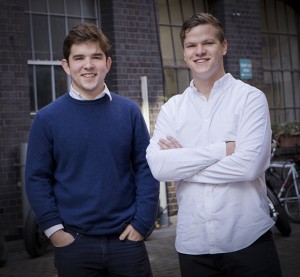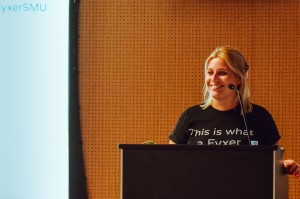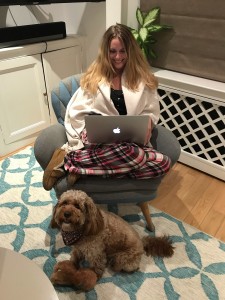Could VA services be the future of the assistant role? Well according to FYXER, it very well could be. PA Life staff writer Vincenzo Ferrara spends a day at the FYXER office to understand why more assistants are opting out of the office and into working from home?
FYXER is a virtual assistant service that hires individual VAs from traditional EA roles and allows them to work remotely from home with the added benefit of working strictly nine-to-five. At just three years old, the company is still relatively new but with a strong source of clients using the service and employees based around the globe, it’s a service that should be on your radar.
As I arrived at the White Collar Factory, just outside Old Street station in London, I couldn’t help but feel the energy of the area really in full flow. The tech-driven business district of the capital never disappoints and that energy followed me onto the first floor of the building, where I met up with the team.
Although the company is remotely based, team members are given the opportunity to meet up once a week at the office, to catch up with each other, network among themselves and discuss future clients and company plans. But, who are FYXER?
When Archie and Richard Hollingsworth decided to start the company three years ago, neither of them had experience of being an assistant. They were two entrepreneur spirited guys in their early twenties. Archie, the younger of the two had owned a business in the food industry and his brother Richard was working in the City for a bank.
When they decided to start a VA service, targeting primarily start-ups and smaller businesses, they made sure to do their research. They interviewed over 60 PAs, EAs and VAs to understand what job roles, daily tasks and routines they were performing, in order to offer a company that was more tailored and specialised, compared to something a recruitment service may other.
They realised quite soon that the ideal candidate for them to hire as staff would be someone with experience in the assistant world, but also someone that is open to change and quite tech savvy. Above all else, candidates must be hard working and a perfectionist, but must not be ‘sassy’.
Within four months of running, they had recruited four members of staff, two of which are still at the company, leading teams to develop both the company and development for the staff. Since then the company has grown, now at the three-year mark, they employ around 40 ‘fyxers’ as they like to be called and are looking to have around 80 employees by this time next year.
The recruitment process:
Helen Osborne, the company’s fourth fyxer joined two and a half years ago because she no longer wanted to work for a giant corporate business with no opportunities to grow. She is now head of recruitment and explained to me how the recruitment process works. She started by explaining that there is a three-part process of employing someone into what seems a happy and busy team.
The first is an informal chat on the phone, common for most jobs now, where applicants talk about their experience and why they’re looking to become a VA or join Fyxer.
Step two is a disc personality test, for things such as positivity and attitude. As an organisation, they are looking to employ positive, happy and hard working people.
The third step is a four-hour practical test, where applicants are given real-life assistant problems to work on remotely. This is all done in one session but can be fitted around your working commitments.
Do I actually work remotely?
I decided to sit with two experienced EAs that both left their corporate roles to join FYXER after over 20 years’ experience between them. Zoe left an international media group after becoming bored with the monotonous daily tasks she was asked to do as well as a real dislike for the daily commute. Amanda who worked for a company in the financial district of London had also fallen out of love with her job and with the City. Her and her partner decided to move to France to live, which meant that to keep up working as an assistant she either needed to learn French very well, very quickly or become virtual. After a quick search online, she decided to apply to FYXER and was successful.
Both commute to the FYXER office once a week to catch up and see everyone. They now work a strict nine to five-thirty and both claim that they have fallen in love with the assistant role again. Working set hours for clients means that they are more of a necessity than a luxury and with a team of helpful – part-time fyxers (part-time employees that cover gaps in full-time employees working hours) – bridging the gaps in their work, for doctor’s appointments or lunchtimes.
They had a strong case for anyone looking to join a VA service and completely changing you assistant lifestyle. They found any help and support they needed to become a VA through FYXER but still got to enjoy the VA lifestyle.
What is the company structure?
For this I sat with an inspiring and charismatic lady named Helen Victor, her role at the company is a ‘pod lead’ (team leader). She explains the structure of the company to me; at the moment, because of the start-up nature of the company, there are jobs being developed for the future. But, at the moment, the company is split into three sections:
- Fyxers: These are the VAs that work for the company, they work for around two to four clients each, depending on the hourly demands of the clients. The hours are pre-paid and worked out when taking on the business. As a fyxer you speak directly with your client, covering everything from scheduling, expenses, event planning and any other tasks you are needed for as an assistant.
- Pod Lead: A more senior role in the company, you are responsible for around five or six individual fyxers and their work, as well as your own clients you are a fyxer for.
- The management team, who look at everything from sales to developing the company internally and externally.
Anything else I should know about FYXER?
They might be a young company that have grown rapidly, but due to the recruitment process, they seem to have all of the staff under the brand working towards the same goals. On the one day a week meet up days, they break the day down into smaller segments, to give everyone the opportunity and the buzz to want to come into the office and work.
They participate in the Swedish working ritual of ‘Fika’, the idea that for half an hour during the working day, everyone gets together for cake and coffee to socialise. The only rule is that you must not talk about work. It seems to be a real moral raiser and gives those that would normally work isolated at home, spend time with their colleagues.
After the office day, they have a roundtable event, where those that have stuck around after working hours can sit down with everyone else in the company including the owners, to discuss the direction of the company, solve any problems and talk about future work/training opportunities.
Fun day events take place once a month, where the team get together and take part in an event. This can vary from a pub quiz to crazy golf and other fun team-building activities.
Overall:
I think after spending some time at the FYXER offices, I am convinced that the employees of the company do love working for them. They have become their own assistant network, sharing ideas and occasionally sharing work in order to get the job done. The office is driven by motivation and enthusiasm. I don’t think the VA service model is for everyone but it appears to be working for those that work for the company. The two brothers that own the company, although young, appear to have a the respect of those they work with and have a business maturity well beyond their years.
As a company they set up informal panel talks that allow audience participation and cover the issues that are important to assistants of all kinds, and I hope they maintain doing this for both the company and the wider-world of assistants out there.
So to answer my original question, could VA services be the industry future? It might not for everyone, but for smaller companies and start-ups that don’t want to employ someone full time because of costs and realistically not having enough usage for a PA/EA, then I think there is a gap in the market for companies like FYXER going forward.














